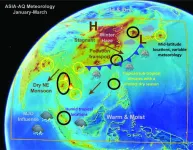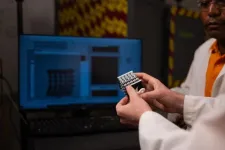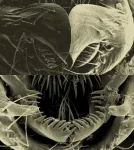(Press-News.org) PHILADELPHIA, PA – NRG Oncology (NRG), a National Cancer Institute (NCI) National Clinical Trials Network (NCTN) group, recently announced that they have named two health equity fellows as a part of the organization’s Health Equity Fellowship Program. Fellowship awardees include Dr. Onyinye Balogun and Dr. Stephanie Rieder.
NRG’s Health Equity Fellowship Program was established by Joan Walker, MD, of the University of Oklahoma and an NRG NCI Community Oncology Research Program (NCORP) Principal Investigator, to train selected early-stage investigators in the NRG Oncology system by means of a structured mentorship experience. The program has an emphasis on the recruitment of researchers from underrepresented groups. Selected fellows receive an award of $50,000 for two years with an end result of developing a new research project within NRG Oncology.
This year, our two applicants were able to be selected due to the generosity of donations from the American Society for Radiation Oncology (ASTRO), West Valley Ovarian Cancer Alliance (WVOCA), and the RTOG Foundation,
Onyinye Balogun, MD, MSc, is an Assistant Professor of Radiation Oncology at the New York Presbyterian Brooklyn Methodist Hospital/Weill Cornell Medicine and is the recipient of the 2024 NRG Health Equity Fellowship funded by ASTRO and the RTOG Foundation. Her career and research to date has been focused on improving outcomes for gynecological cancer patients and mitigating gynecologic cancer disparities globally. Dr. Balogun has been awarded grants to teach modern radiation therapy and brachytherapy techniques in Armenia, Nigeria, Ghana, and Gabon and was funded by Weill Cornell Medicine and the Institute for African Development for her medical education initiative “Chartrounds Africa” and “Chartrounds Brachytherapy”, which provide peer review of treatment plans for oncologists worldwide. Additionally, Dr. Balogun designed and successfully secured funding from the New York Genome Center for the Polyethnic 1000 Endometrial Project, a study of genomic variants in aggressive endometrial cancer subtypes among women of African ancestry. Dr. Balogun’s long-term research goal is to use the knowledge of the genomics of endometrial cancer to design new therapeutic strategies that will mitigate the inequities in gynecologic cancer outcomes.
Dr. Balogun is currently involved with NRG Oncology as a member of the Radiation Therapy (RT) Gynecologic Oncology Working Group and is actively enrolling patients into the organization’s clinical trials as an investigator. She is a GlobalRT co-founder, a past Vice Chair of the ASTRO International Education Subcommittee – Africa, a review editor for Frontiers in Oncology, and an Associate GYN Section Editor for Practical Radiation Oncology. She is also a member of ASTRO, the American Brachytherapy Society, the American Society of Clinical Oncology, the ASCO International Educational Steering Group, the ASCO International Advisory Counsil, and the New York Genome Center Polyethnic 1000 Steering Committee. She is also the Co-Founder of Mission-Driven Tech, a new women’s health venture backed by Weill Cornell Medicine, that is transforming gynecologic cancer care through modernizing brachytherapy medical devices.
“ASTRO is proud to support efforts that equip emerging leaders from underrepresented communities with the resources to bring their visions of more equitable clinical trials closer to reality and empower them to become driving forces in our field. We congratulate the new Fellows and look forward to their contributions to fostering greater inclusiveness in radiation oncology research.” said Jeff M. Michalski, MD, MBA, FASTRO, Chair of the ASTRO Board of Directors.
“Dr. Onyinye Balogun's lifelong dedication to health equity shines in her selection as the 2024 RTOGF/ASTRO Health Equity Fellow. Her exciting PI3K inhibitor + SBRT trial in endometrial cancer with its focus on tackling ethnic disparities demonstrates her unwavering commitment. We eagerly await the results,” added Dr. Quynh-Thu Le, MD, FACR, FASTRO, Professor and Chair of the Department of Radiation Oncology at Stanford University and Chair of the RTOG Foundation.
Stephanie Rieder, MD, PhD, is an assistant professor in the Division of Gynecologic Oncology at University of New Mexico Comprehensive Cancer Center and is the recipient of the 2024 NRG Health Equity Fellowship funded by WVOCA. Dr. Rieder’s research efforts have been committed to elucidating cancer care experiences among diverse gynecologic oncology patients, including the recent development and leadership of a mixed-methods study investigating decision-making regarding therapeutic clinical trial enrollment among gynecologic oncology patients in New Mexico. The data from this study unveiled unanticipated barriers which will drive the evaluation of novel screening tools and interventions to encourage better patient support and improved clinical care for marginalized patients, particularly within American Indian, Hispanic, and rural populations. Dr. Rieder desires to utilize this fellowship to help improve prevention and early detection of ovarian cancer through promoting expansion of genetic testing and addressing complex patient burdens and community concerns regarding cascade testing among high-risk individuals in underserved communities.
Dr. Rieder is currently a member of the Society for Social Studies of Science, the American College of Obstetrics and Gynecology, the Society of Gynecologic Oncology, The American Society of Clinical Oncology, and Scholars in the Social Sciences and Humanities. She also was the recipient of the 2021-2023 Foundation for Women’s Cancer Diversity and Inclusion Award.
“The West Valley Ovarian Cancer Alliance is pleased to support Dr. Rieder’s research of ovarian cancer prevention, improved quality of life, and patient survivorship,” stated Laurel Pracht, Founder of the WVOCA and a 24-year ovarian cancer survivor.
NRG Oncology is eager to engage these new fellows within our organization and looks forward to the contributions that stem from their involvement in this program. If you would like to donate the NRG Health Equity Fellowship Program, please visit https://www.nrgoncology.org/Health-Equity.
About NRG Oncology
NRG Oncology conducts practice-changing, multi-institutional clinical and translational research to improve the lives of patients with cancer. Founded in 2012, NRG Oncology is a Pennsylvania-based nonprofit corporation that integrates the research of the legacy National Surgical Adjuvant Breast and Bowel Project (NSABP), Radiation Therapy Oncology Group (RTOG), and Gynecologic Oncology Group (GOG) programs. The research network seeks to carry out clinical trials with emphases on gender-specific malignancies, including gynecologic, breast, and prostate cancers, and on localized or locally advanced cancers of all types. NRG Oncology’s extensive research organization comprises multidisciplinary investigators, including medical oncologists, radiation oncologists, surgeons, physicists, pathologists, and statisticians, and encompasses more than 1,300 research sites located world-wide with predominance in the United States and Canada. NRG Oncology is supported primarily through grants from the National Cancer Institute (NCI), part of the National Institutes of Health, and is one of five research groups in the NCI’s National Clinical Trials Network. www.nrgoncology.org
About ASTRO
The American Society for Radiation Oncology (ASTRO) is the largest radiation oncology society in the world, with nearly 10,000 members who are physicians, nurses, biologists, physicists, radiation therapists, dosimetrists and other health care professionals who specialize in treating patients with radiation therapies. For information on radiation therapy, visit RTAnswers.org. To learn more about ASTRO, visit our website and follow us on social media.
About RTOG Foundation
The RTOG Foundation is a nonprofit organization dedicated to improving outcomes for cancer patients through the conduct of practice changing clinical trials. RTOGF collaborates with partners from industry and federally funded programs to support its research. RTOGF is the successor of the National Cancer Institute(NCI)-funded Radiation Therapy Oncology group that was organized in 1968 as a national clinical cooperative group for the purpose of conducting multicenter radiation therapy research and clinical investigations. It was part of the NCI-funded cooperative group program and managed by the American College of Radiology (ACR) from 1971 until 2014. During that time, it activated over 500 protocols, accrued more than 110,000 patients to cooperative group studies, and published over 1,000 papers reporting the results of its findings. RTOGF has continued its close relationship with ACR to engage in clinical trial research collaborations with a variety of industry partners and participates in Federal grant-funded research through its leadership in the NCI National Clinical Trial Network group NRG Oncology. www.rtog.org
About the West Valley Ovarian Cancer Alliance (WVOCA)
The West Valley Ovarian Cancer Alliance, WVOCA, is a grassroots nonprofit charitable organization of ovarian cancer survivors, caregivers, and dedicated community volunteers. The Alliance conducts a yearly golf tournament to raise awareness of symptoms within our community. Net funds are directed toward ovarian cancer treatment and prevention research strategies. The Alliance is based in Sun City, AZ. www.westvalleyoca.org
END
NRG Oncology selects Health Equity Fellows for 2024
2024-02-02
ELSE PRESS RELEASES FROM THIS DATE:
Neptune-like exoplanets can be cloudy or clear — new findings suggest the reason why
2024-02-02
LAWRENCE — The study of “exoplanets,” the sci-fi-sounding name for all planets in the cosmos beyond our own solar system, is a pretty new field. Mainly, exoplanet researchers like those in the ExoLab at the University of Kansas use data from space-borne telescopes such as the Hubble Space Telescope and Webb Space Telescope. Whenever news headlines offer findings of “Earth-like” planets or planets with the potential to support humanity, they’re talking about exoplanets within our own Milky Way.
Jonathan Brande, a doctoral candidate in the ExoLab at the University of Kansas, has just published findings in the open-access ...
nTIDE January 2024 Jobs Report: Despite minor shifts, employment for people with disabilities remains near historic highs
2024-02-02
East Hanover, NJ – February 2, 2024 – Labor market indicators showed slight declines over the last two months for both people with and without disabilities, according to today’s National Trends in Disability Employment – semi-monthly update (nTIDE), issued by Kessler Foundation and the University of New Hampshire’s Institute on Disability (UNH-IOD). These declines may reflect the end of seasonal employment and the impact of the Federal Reserve’s anti-inflationary measures aimed at minimizing the risk of recession. ...
NRL joins Airborne and Satellite Investigation of Asian Air Quality (ASIA-AQ)
2024-02-02
WASHINGTON – U.S. Naval Research Laboratory (NRL) meteorologists, in partnership with NASA, will join a team of international scientists to participate in the Airborne and Satellite Investigation of Asian Air Quality (ASIA-AQ) experiment beginning on February 2.
NRL’s collaborators, David Peterson, Ph.D., meteorologist, Theodore McHardy, Ph.D., American Society for Engineering Education postdoctoral researcher, Nicholas Gapp, Science Applications International Corporation ...
New drug could prevent diabetic eye and kidney disease in people with diabetes
2024-02-02
New research has shown a new type of inhibitor drug could prevent microvascular diabetic complications, such as diabetic eye and kidney disease. The University of Bristol-led research is published in Cardiovascular Diabetology.
Diabetes, a disease which results in uncontrolled blood glucose levels, is estimated to affect one in 11 adults worldwide. Even when managed, this common disease can result in life-altering complications, impacting the small blood vessels of the body, known as the microvasculature.
While treatments ...
UT research breaking records, growing impact in Tennessee and beyond
2024-02-02
The University of Tennessee, Knoxville, continued to expand its impact and research footprint last year, breaking university records for both research expenditures and sponsored project awards for the second straight year.
Since 2019, UT has more than doubled its sponsored project awards, reaching a record $428 million in the fiscal year that ended in June 2023. The university also reported $339 million in research expenditures in fiscal year 2023, an increase of nearly $15 million over fiscal year 2022 and the highest amount in UT history. Research expenditures include internal and external funds that support UT research ...
Rare 3D fossils show that some early trees had forms unlike any you’ve ever seen
2024-02-02
In the fossil record, trees typically are preserved with only their trunks. They don’t usually include any leaves to show what their canopies and overall forms may have looked like. But now, researchers reporting in the journal Current Biology on February 2 describe fossilized trees from New Brunswick, Canada with a surprising and unique three-dimensional crown shape.
“The way in which this tree produced hugely long leaves around its spindly trunk, and the sheer number over a short length of trunk, is startling,” says Robert Gastaldo of Colby College in Waterville, Maine.
The forms taken by these ...
Fruit flies give further insight into evolution of male genitalia driven by sexual selection
2024-02-02
Embargoed until 11am ET USA/4pm GMT UK on Friday 2 February (Current Biology embargo)
-With pictures-
Fruit flies have provided scientists with new insight into the genetic basis for the rapid evolution of male external genitalia driven by sexual selection.
Secondary sexual characteristics such as peacocks’ tails and the male external genitalia of insects are known to be among the fastest evolving animal body parts.
It is thought that this is driven by sexual selection including through female choice and the different evolutionary needs of each sex to find the right mate and maximise their fitness.
Now scientists at Durham University and Oxford ...
Availability of mental telehealth services in the US
2024-02-02
About The Study: The findings of this study of 1,404 mental health treatment facilities indicate that there were no differences in the availability of mental telehealth services based on the prospective patient’s clinical condition, perceived race or ethnicity, or sex; however, differences were found at the facility-, county-, and state-level. These findings suggest widespread disparities in who has access to which telehealth services throughout the U.S.
Authors: Jonathan Cantor, Ph.D., of the RAND Corporation in Santa Monica, California, is the corresponding author.
To access the embargoed study: Visit ...
Risk of venous thromboembolic events after surgery for cancer
2024-02-02
About The Study: This study including 432,000 patients who underwent major surgery for eight cancer types found an increased rate of venous thromboembolism associated with cancer surgery. The risk persisted for about two to four months postoperatively but varied between cancer types. The increased rate is likely explained by the underlying cancer disease and adjuvant treatments. The results highlight the need for individualized venous thromboembolism risk evaluation and prophylaxis regimens for patients undergoing different surgery for different cancers.
Authors: Johan ...
Geographic differences in telehealth found among mental health clinics
2024-02-02
Telehealth availability for mental health care varies significantly across states -- from less than half of treatment facilities contacted in states like Mississippi and South Carolina to every facility contacted in states like Maine and Oregon, according to a new RAND study.
Researchers found there were differences in services offered depending on whether a mental health treatment facility was located in in a rural or metropolitan area.
The types of services offered -- and the types of telehealth modalities available -- also varied widely among ...





